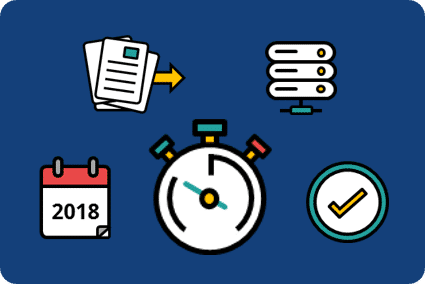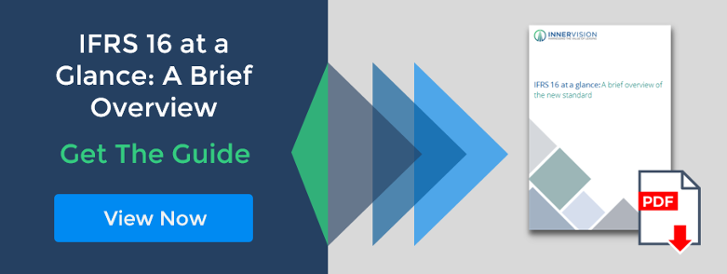When Do You Need To Be Ready For IFRS 16?
Updated 26th May 2021 | 4 min read Published 17th October 2017

Before getting stuck into how to prepare for IFRS 16 and understanding the changes to lease accounting standards that will affect your business, it’s a more pertinent question to ask, “When do you need to be ready?”
Question: When Do You Need To Be Ready For IFRS 16?
Answer: Now. Even Though The Implementation Deadline Is 1st January 2019
The lease accounting standards which are changing as part of IFRS 16 come into effect on 1st of January 2019, but it’s necessary to be ready and prepared before this date.
As of the first day of 2019, IFRS 16 will replace the existing standard practices outlined in IAS 17 and all those companies which use leasing or intend to use leasing and adhere to IASB guidelines will be impacted. Given that the deadline, at the time of writing, is still a considerable number of months away, many companies could be forgiven for delaying getting ready.
Forgiven, that is until the amount of work involved in getting ready for IFRS 16 is considered.
If IFRS 16 Isn't Due Until 1st January 2019, Why Are Companies Getting Ready Now?
It’s complicated and the reasons are, broadly, two-fold.
In the first instance, the magnitude and number of changes which are required in order to get ready for IFRS 16 mean that it simply takes time to prepare. Besides the whole host of knock-on impacts from the changes, such as the effect that IFRS 16 will have on key financial metrics, the biggest single change is that operating leases will as a result of the new standards effectively cease to exist as a separate category for accounting purposes.
This means that all leases will now be represented on balance sheet. To illustrate, an estimated US$2.8 Trillion is expected to drop onto balance sheet reports and this must impact profit and loss accordingly.
Furthermore, the definition of what actually constitutes a lease and what constitutes a service agreement is changing, and vice versa. What this means to you is that your company will need to gather and assess all the related agreements and associated paperwork in order to begin ensuring compliance is achieved in time for the deadline.
And the second broadly-complicating reason for the early need to prepare for IFRS 16 is that there are possible exemptions, early adoption and required retrospective reports that need consideration.
Possible Exemptions
Under the new standards, there are some exemptions which you may or may not wish to be applied, for example, some “small ticket items” (under approximately $5,000 list price of the asset) could be made exempt from the standard compliant reports. But it would need to be financially beneficial to do so.
Also, the “small ticket item” cannot be a necessary part of a larger value leased asset’s use as it is essentially then no longer a small ticket item. To illustrate, you may have a lease agreement to provide tyres for your company vehicle and they could be classed as a small ticket item. But your vehicle cannot run without said tyre agreement in place so they are no longer a small ticket item.
Early Adoption & Retrospective Reports
It may be possible that you qualify for and wish to opt for early adoption of IFRS 16. Obviously, this means that your deadline is then brought forward accordingly, but the positive side of this move is that, assuming you have the resources to implement adoption now rather than later, a major headache is dealt with at a time that suits you.
But, be aware, early adoption is only available alongside IFRS 15 ‘Revenue from Contracts with Customer.’
Even though the implementation deadline for all working under IASB guidance is the 1st of January 2019, retrospective reports will be needed to compare compliance with IFRS 16 against previous periods.
Some good news, however, is that the IASB has provided some transition reliefs to allow entities to ease the financial burden of achieving compliance.
What About FASB ASC 842? Is That The Same As IFRS 16?
For companies who comply with FASB standards, Topic 842 is effectively the equivalent of IFRS 16 and replaces FAS 13/Topic 840.
For Public entities, the changeover to FASB ASC 842 has an earlier deadline for implementation than IFRS 16. The deadline is 15th December 2018 with retrospective reports.
And for Private entities, the deadline is a year later on 15th December 2019.
One of the fundamental aims of the two boards, the IASB and FASB were to work in unison to produce one consistent standard across IFRS and US GAAP. Unfortunately, the two boards have been unable to achieve complete convergence on every aspect of the new lease accounting standards. However, the two boards are both 100% converged on undertaking the fundamental issue of recognising an asset and a liability on balance sheet. Which was one of the main goals from the onset.
Some Further Reading
If you are ready to learn further details about these changes to lease accounting, then take a look at these free resources our team has produced. They’re designed purely to help you and your colleagues understand what the main changes of IFRS 16 and ASC Topic 842 are, how they affect different financial ratios, metrics and reports, and educate you on the topic enough to bring your colleagues up to speed with the size of the task at hand.
Every moment you delay in preparing for IFRS 16, the bigger and harder compliance becomes. Open your free and handy resource here:


